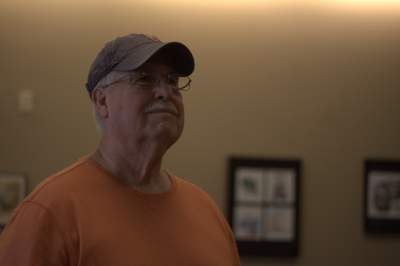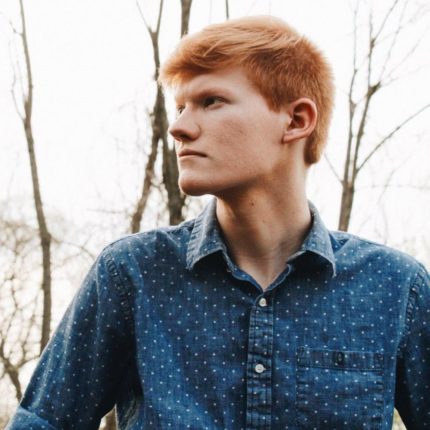By Justin Katz | gargoyle@flagler.edu
 Michael Denney knows all too well about the transition from war zones to civilian life. For the 70-year-old Vietnam veteran and Flagler College student who served seven years in the U.S. Air Force, some wounds never heal.
Michael Denney knows all too well about the transition from war zones to civilian life. For the 70-year-old Vietnam veteran and Flagler College student who served seven years in the U.S. Air Force, some wounds never heal.
“I was in a bunker and it was getting really hot from the smoke and rockets going off. So I stuck my head out and as I did, a rocket hit nearby,” said Denney. “I got thrown up into the air and when I landed I wasn’t able to move because I started going into shock.”
Denney has a scar on the left side of his neck to remind him of that day. But he says there are many other scars — mental, psychological — that vets also face when they return.
“One day you’re fighting for your life and the next day your tour is up and you come home,” said Denney. “Little things matter here, but over there the only thing that matters is saving your life. Staying alive.”
There are over 2.5 million American veterans of Iraq and Afghanistan, according to the U.S. Census. An estimated 14 percent of them are facing Post-Traumatic Stress Disorder (PTSD) and/or depression, according to a study in the U.S. National Library of Medicine. Studies have shown only half of those with PTSD seek treatment, and of those who seek it, about half receive “minimally adequate” treatment. On top of that, many veterans who are still suffering scars from the past have little confidence in the civilians who claim to support them.
Albert Tetrault, an adjunct professor at Flagler College and retired Airman, also served in the Vietnam War and is reminded on a regular basis about the scars many servicemen still bear.
“History has shown a lot of people can’t be in uniform one day and then be a civilian driving a car the next day,” said Tetrault.
Tetrault represents veterans at his legal practice, many of whom suffer from PTSD. He said that one of his clients spent a year driving to a commonly used airport in Iraq. The road was a hotspot for improvised explosive devices disguised as construction. This has resulted in him having severe anxiety while driving by construction zones back in the United States.
Another veteran, Tetrault said, can’t go to WalMart because it is a confined, crowded area. This is the same kind of environment where he saw suicide bombers hide. The people Tetrault represents aren’t alone. The U.S. Department of Veterans Affairs estimates that PTSD occurs in 11 to 20 percent of Iraq and Afghanistan veterans, 10 percent of Gulf war veterans and 30 percent of Vietnam veterans. PTSD is not the only problem Vietnam veterans in particular face. Those who served in the Vietnam war were exposed to dangerous chemicals that have permanently impacted their health.
“I am 80 percent disabled and have renal disease,” said Denney. “My kidneys will eventually fail and I will be put on dialysis.” Denney was exposed to Agent Orange, a herbicide used by the U.S. Military during a warfare program known as Operation Ranch Hand.
For Denney, the effects of being a service member have impacted his health, but for other veterans their health isn’t the issue. The bigger problem is what they lost during their tour of service.
 Alejandro Sarandrea served in the U.S. army from 2005 to 2011 and was deployed to Kuwait and Iraq. His wife, Jessica Sarandrea, was also a service member.
Alejandro Sarandrea served in the U.S. army from 2005 to 2011 and was deployed to Kuwait and Iraq. His wife, Jessica Sarandrea, was also a service member.
“We were stationed at the same base. It was hit by a mortar attack and she didn’t make it,” said Sarandrea.
When he and fellow soldiers got off the buses that brought them home, they were called into formation by their colonel.
“Look to your left and look to your right,” said Colonel Volesky, now a 2-star general. “Some of us are missing from this formation because they paid the ultimate price.” And with that, everyone was dismissed and allowed to reunite with family.
Sarandrea says the wind was knocked out of him twice that day. Once because he had lost his battle buddy and the second time because he had lost his wife.
This loss made Sarandrea question why he was fighting, but asking questions led to no resolution. Even the Secretary of Defense could not provide him with anything except for condolences.
“I asked him [Secretary of Defense Robert Gates] what we were doing in Iraq. All he said was ‘our job,’” said Sarandrea. This answer was unsatisfying and left him with doubts. He needed a reason for what happened — to his wife and to himself.
Sarandrea sees that day he returned home as the hardest in his life.
“She asked me sometime before she passed to better myself and that’s what keeps me going,” said Sarandrea.
Although Sarandrea is not battling PTSD and the loss of his wife can never be made whole, programs are being made to help veterans with the transition from military to civilian life.
The National Center for PTSD has launched a Web site called About Face that aims to better the lives of veterans by providing information on treatment options and testimonials from others who have endured the same issues.
Denney sees programs like this as an option for anyone who does not believe they have any prospects, including for a job.
“You don’t have to be a killer,” said Denney. “They have all kinds of jobs.”
Even through it all, Sarandrea still thinks about his time in the service on a regular basis, and much of it is positive.
“I recommend it to everybody,” he said. “You have to sacrifice something of yourself, and once you do that, you become more in tune with yourself. I want to go back every day. I love it.”





Be the first to comment on "Old wounds never heal: Veterans facing issues transitioning to civilian life"